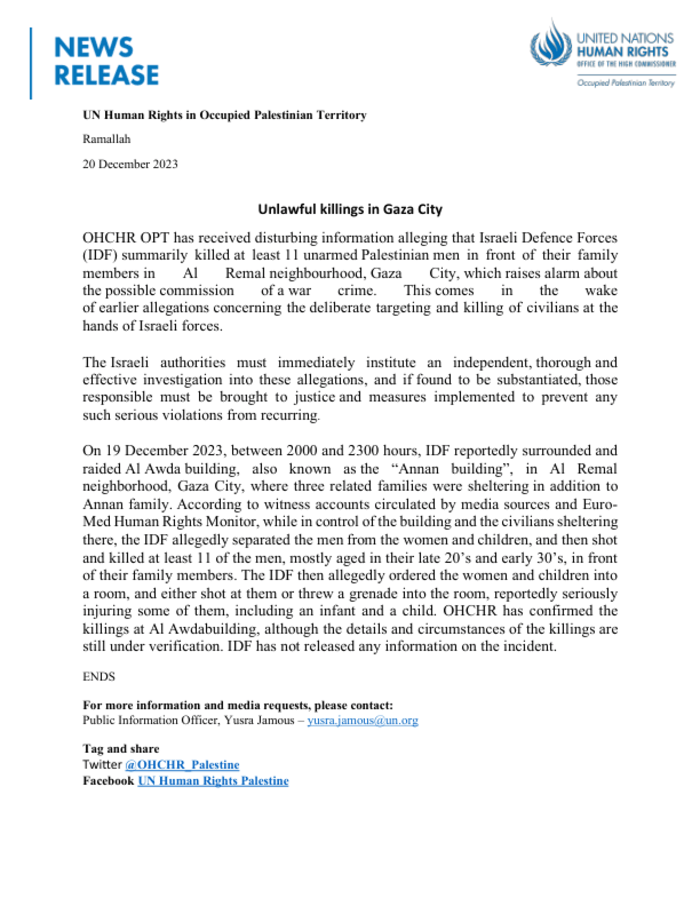Liliea
The Living Force
To understand
As a personal exercise to try to understand this new situation around Gaza I wanted to share this comparison between two media the Financial Times (washington) and The Cradle (iran) I have only taken the title and the first paragraph to make it short then, below, some conclusions.To say before that as in a newsroom the media approach the same news and each one interprets and adjusts to its convenience "the reality" taking into account in this case that this news is finally a hypothetical case or an "open question":
+ US-led coalition to create safe corridor in Red Sea as ship diversions mount (Financial Times)
Naval grouping and shipowners look to bolster security against threat of Iranian-backed rebel attacks+A US-led military coalition and shipowners are racing to strengthen security in a key artery of global trade in the Middle East, as more than 100 vessels start to divert around Africa to avoid attacks by Iranian-backed militia.
- Operation Prosperity Guardian, a strengthened naval task force in the Red Sea unveiled by the Pentagon on Monday, is planning to establish a safe corridor for commercial shipping together with at least half a dozen allies, according to three people familiar with the matter.
The current plan is for Nato naval vessels to provide a shield against drones and missile attacks by Iranian-backed Houthis in Yemen, as opposed to escorting commercial ships in convoys through the Bab-el-Mandeb strait via which 10 per cent of seaborne trade passes.
“Ships and aircraft from multiple nations are and will continue to join the United States in conducting maritime surveillance and taking defensive action as appropriate to protect commercial ships from the threat posed by the Houthis,” US National Security Council spokesman John Kirby said on Tuesday.
A US official said that the plan was in its early stages and could change.
+ US seeks 'safe corridor' to deter Yemen attacks on Israeli ships (The Crowdle)
Ansarallah leader Abdul Malik al-Houthi reiterated his support for Gaza and vowed Yemeni forces will not 'stand idly by' if attacked by US Navy
A US-led naval task force in the Red Sea is planning to establish a safe corridor for commercial shipping in response to attacks by Yemeni forces on Israel-linked ships, the Financial Times (FT) reported on 20 December. TCAccording to three people familiar with the matter, the current plan is for NATO naval vessels to shoot down drones and missile attacks by the Ansarallah-led Yemeni forces, rather than escort commercial ships in convoys through the narrow Bab al-Mandeb strait at the entrance of the Red Sea.
“Ships and aircraft from multiple nations are and will continue to join the United States in conducting maritime surveillance and taking defensive action as appropriate to protect commercial ships from the threat posed by [Ansarallah],” US National Security Council spokesman John Kirby said on Tuesday.
A US official said that the plan was in its early stages and could change.
US seeks 'safe corridor' to deter Yemen attacks on Israeli ships
Ansarallah leader Abdul Malik al-Houthi reiterated his support for Gaza and vowed Yemeni forces will not 'stand idly by' if attacked by US Navy
A US-led naval task force in the Red Sea is planning to establish a safe corridor for commercial shipping in response to attacks by Yemeni forces on Israel-linked ships, the Financial Times (FT) reported on 20 December.
According to three people familiar with the matter, the current plan is for NATO naval vessels to shoot down drones and missile attacks by the Ansarallah-led Yemeni forces, rather than escort commercial ships in convoys through the narrow Bab al-Mandeb strait at the entrance of the Red Sea.
“Ships and aircraft from multiple nations are and will continue to join the United States in conducting maritime surveillance and taking defensive action as appropriate to protect commercial ships from the threat posed by [Ansarallah],” US National Security Council spokesman John Kirby said on Tuesday.
A US official said that the plan was in its early stages and could change.
"We will not stand idly by if the Americans are tempted to escalate further and commit foolishness by targeting our country or waging war against it," Ansarallah leader Abdul Malik al-Houthi said in response in a speech on Wednesday.
"Any American targeting of our country will be targeted by us, and we will make American battleships, interests, and navigation a target for our missiles, drones, and military operations," he said in a televised speech.
The US initiative comes as over 100 commercial ships have chosen to bypass the Red Sea and Suez Canal, through which 10 percent of seaborne trade passes, and instead take the much longer route around the horn of Africa on their way to Europe.
Shipping companies have decided to take the journey around Africa, which is 3,200 miles longer and adds two weeks to shipping times, following Ansarallah attacks on at least 15 vessels in the region since 18 November.
Ansarallah has vowed to attack any ship with Israeli-links as it seeks to support Gaza, where Israel is carrying out what leaders of the Yemeni resistance group consider Genocide.
Almost all of the world’s largest container shipping lines including MSC, AP Moller-Maersk and CMA CGM are no longer sending vessels through the Red Sea and Suez Canal, while oil majors BP and Equinor have paused shipments through the strategic waterway as well.
“We can clearly see a drop off in container ships heading through the Gulf of Aden and up the Red Sea,” said Jean-Charles Gordon, ship tracking director at Kpler, a trade data provider.
Ansrallah’s solidarity with Palestine is causing shipping firms still planning to travel through the Red Sea to seek to add armed security teams to their vessels.
Dimitris Maniatis, chief operating officer of Seagull Maritime, a maritime security company, said that inquiries had “risen tremendously.”
“It’s a gold rush,” he said, adding that shipping companies were asking for teams of six to eight guards, preferably with frontline combat experience. “Up until now, we were at maximum three.”
However, it is unclear what advantage such security details would provide when facing attacks by drones and missiles.
According to the FT, it remains to be seen if oil and gas tankers and bulk carriers will follow suit and re-route around Africa as well.
Oil and liquified natural gas shipments move not only north through the Suez Canal to Europe, but also south through the canal from Russia toward Asia. Russia began exporting oil to Asia after the beginning of the 2022 Ukraine war. European countries seeking to isolate Russia cut themselves off from cheap pipeline-provided Russian natural gas and have instead turned to importing more expense liquid natural gas by tanker from the US and Gulf countries.
US-led coalition to create safe corridor in Red Sea as ship diversions mount
Naval grouping and shipowners look to bolster security against threat of Iranian-backed rebel attacks
A US-led military coalition and shipowners are racing to strengthen security in a key artery of global trade in the Middle East, as more than 100 vessels start to divert around Africa to avoid attacks by Iranian-backed militia.
Operation Prosperity Guardian, a strengthened naval task force in the Red Sea unveiled by the Pentagon on Monday, is planning to establish a safe corridor for commercial shipping together with at least half a dozen allies, according to three people familiar with the matter.
The current plan is for Nato naval vessels to provide a shield against drones and missile attacks by Iranian-backed Houthis in Yemen, as opposed to escorting commercial ships in convoys through the Bab-el-Mandeb strait via which 10 per cent of seaborne trade passes.
“Ships and aircraft from multiple nations are and will continue to join the United States in conducting maritime surveillance and taking defensive action as appropriate to protect commercial ships from the threat posed by the Houthis,” US National Security Council spokesman John Kirby said on Tuesday.
A US official said that the plan was in its early stages and could change.
The initiative comes as huge numbers of vessels have started rerouting to take an extra-3,200 mile journey around Africa following attacks on at least 15 vessels in the region since November 18. The Houthis appear to have been attacking vessels with links to Israeli, although some have had little or no connection to the country for years.
As of midnight on Tuesday 103 vessels capable of carrying 1.3mn 20ft shipping containers had rerouted via the Cape of Good Hope, according to Kuehne+Nagel, a Swiss logistics group, which expects further increases. Including bulk carriers and tankers, the number is far higher.
The biggest reshaping of global trade since Russia’s invasion of Ukraine threatens to cause lengthy queues at ports, supply chain disruptions for retailers and stoke inflation that central banks have been battling to tame.
Brent crude, the international oil benchmark, rose 1.1 per cent on Wednesday to breach $80 per barrel, taking gains to over 9 per cent in just nine days, while the reference European gas price rose as high as €34.62 per megawatt hour. It was up 2.2 per cent by Wednesday afternoon.
Almost all of the world’s largest container shipping lines including MSC, AP Møller-Maersk and CMA CGM are no longer sending vessels through the Red Sea that goes to and from the Suez Canal, while oil majors BP and Equinor have paused shipments through the chokepoint.
“We can clearly see a drop off in container ships heading through the Gulf of Aden and up the Red Sea,” said Jean-Charles Gordon, ship tracking director at Kpler, a trade data provider.
The redrawing of trade flows will deprive Egypt of significant revenue generated from ships travelling through the Suez Canal, while South Africa is expected to hit a monthly record for fuel oil imports in December as more ships stop to refuel at its ports, according to Kpler estimates.
Shipowners are increasingly looking to bolster security on board their ships to keep travelling through the chokepoint of global trade.
Kpler has observed an increase in ships displaying an “armed guards on board” signal through their messaging systems to coastal authorities as they go through the Bab-el-Mandeb strait in an effort to ward off attacks.
Dimitris Maniatis, chief operating officer of Seagull Maritime, a maritime security company, said that inquiries had “risen tremendously” in response to Houthi attacks and the Somali pirate hijacking of the Ruen bulk carrier last week.
“It’s a gold rush,” he said, adding that shipping companies were asking for teams of six to eight guards, preferably with frontline combat experience. “Up until now, we were at maximum three.”
Several security firms cautioned, however, that private guards could do little against missiles and drones controlled by organised militia.
Instead, Chris Farrell, commercial director at Neptune P2P Group, another maritime security company, said its “phones have not stopped ringing” for risk assessment services and training of crews to identify and respond to risks.
Much of the attention will now turn to whether many of the world’s oil and gas tankers and bulk carriers will follow the scale of the container shipping exodus, which could add pressure on global commodity prices.
Around 7mn barrels a day of crude oil and refined products flow through the Bab-el-Mandeb strait but the route has become vital for Russia to export to Asia with 4mn b/d heading south, according to Kpler data analysed by Goldman Sachs.
Some traders such as Gunvor already appear to have rerouted liquefied natural gas tankers according to ship-tracking data from energy consultancy ICIS, and shipbrokers say that several more operators want to avoid the region. Euronav, one of the world’s biggest oil tanker owners, is telling customers that it will not take the Red Sea route.
“Should the US-led initiative provide sufficient protection, then we may use the Red Sea route again,” said Euronav chief executive Alexander Saverys. “But at the moment that is an open question.”
Reporting by Harry Dempsey, Ian Johnston, Shotaro Tani, Lukanyo Mnyanda and George Steer in London, Henry Foy in Brussels and Felicia Schwartz in Washington
The obvious is to see the United States as the defender of the oppressed in the war against "terrorism"...one does not wonder anymore how long this farce will go on, but how it will end (?), and this continuous play of words Pentagon-Nato that implies that no affiliated country has an opinion, they just keep quiet and obey.
Then there is also the old trick of "it is for your security" (that of Israel and its people) which masks NATO's control over the Red Sea area increase its belligerence and takeover of the area and its economy (to my mind an illusion), which implies Arab oil and its history with Yemen-Obama.
What emerges from that is the obvious, and is really what I think this article is written for, which is to make clear the relationship between Houthis and Iranians almost as synonyms-twins, for the gullible, which The Cradle tries to clarify or unlink by correcting it with the word Ansarallah, and avoiding diplomatically aggravate Iran's relations with Arabia and all the work done by the BRICS.
Finally I think this is also an operation similar to what they did at the beginning of Biden's when a Evergreen cargo ship closed the Suez canal by "accident", also the ports in Los Angeles did not let cargo ships approach and in China there were also problems in the ports, which created shortages and rising prices, so it is possible that the attempt will be repeated.
But remember that it is " an open question"

US seeks 'safe corridor' to deter Yemen attacks on Israeli ships
Ansarallah leader Abdul Malik al-Houthi reiterated his support for Gaza and vowed Yemeni forces will not 'stand idly by' if attacked by US Navy







